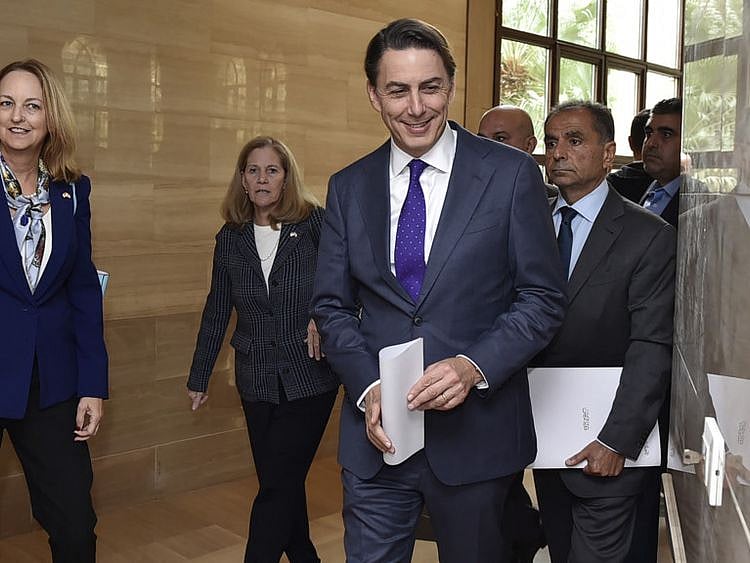Dubai: Despite escalating tensions and ongoing cross-border attacks, there is growing optimism that the Israel-Hezbollah war may soon come to an end.
US Special Envoy Amos Hochstein, during a visit to Beirut on Tuesday, raised hopes for a potential truce, stating that peace is “now within our grasp.”
Hochstein’s remarks follow a series of high-level meetings aimed at brokering a ceasefire, with Lebanon’s leadership offering significant backing for the plan.
In his discussions with Lebanese officials, including Hezbollah-allied parliamentary speaker Nabih Berri, who has played a key role in mediating between the warring parties, Hochstein expressed confidence in the opportunity to halt the fighting.
“I came back because we have a real opportunity to bring this conflict to an end,” Hochstein said at a press conference after the meeting. “It is now within our grasp. As the window is now, I hope the coming days yield a resolute decision.”However, despite cautious optimism, tensions remain high. Hezbollah leader Naim Qassem was expected to deliver a speech regarding the truce, but the group postponed the address shortly after it was announced.
Meanwhile, Israeli Energy Minister Eli Cohen confirmed that “talks regarding an arrangement with Lebanon” are ongoing, but reiterated that Israel would agree to a ceasefire only if its demands are met, including pushing Hezbollah away from the border.
Hochstein’s mission marks a last-ditch attempt by the outgoing US administration to secure a ceasefire in Lebanon, but the path to peace is far from certain.98 aid trucks looted in GazaWhile diplomatic efforts for a ceasefire gain momentum in Lebanon, there is little optimism in the Gaza Strip. A dire food crisis worsened over the weekend when nearly 100 aid trucks were looted by armed men, further exacerbating shortages in an already devastated region.
The theft of these trucks sent food prices soaring, leaving many without access to essential supplies.
In central Gaza, where most of the population has fled the fighting, crowded tent camps are struggling to cope with the lack of food and resources.
Experts warn that famine may already be setting in in northern Gaza, where Israel has been conducting a weeks-long offensive. The ongoing strikes have killed hundreds of people and forced tens of thousands from their homes.
$100 for a bag of flour
On Monday, a woman displaced from Gaza City, who identified herself as Umm Shadi, described the steep rise in prices, saying the cost of flour had surged to 400 shekels (over $100) per bag.
“From the beginning, there are no goods, and even if they are available, there is no money,” said Nora Muhanna, another displaced woman, who had waited five hours for a bag of bread for her children but left empty-handed.The United Nations reported that armed men stole food and other aid from 98 trucks over the weekend, marking the largest such theft since the war began.
A convoy of 109 trucks had been directed by the Israeli military to take an “alternative, unfamiliar route” after passing through the Kerem Shalom crossing, where the robbery occurred.
200 children killed in two months in Lebanon
Meanwhile, the situation in Lebanon remains dire, as Israel continues its military operations. Over the last few days, Israel has stepped up its airstrikes on Hezbollah-controlled areas, including southern Beirut, and struck the capital itself three times. The strikes have killed dozens of people and intensified the humanitarian crisis in the region.Since the conflict erupted with Hezbollah’s attacks on Israel, more than 3,510 people have been killed in Lebanon, according to local authorities.
The majority of these fatalities have occurred since late September, including over 200 children, as reported by the United Nations.
The war, which escalated in late September after nearly a year of deadly exchanges between Hezbollah and Israeli forces, has seen Israel expand its military focus from Gaza to Lebanon.
Israel has vowed to secure its northern border and facilitate the return of tens of thousands of people displaced by the cross-border violence.Israeli stance on ceasefireDespite international pressure for a ceasefire, Israeli Prime Minister Benjamin Netanyahu remains adamant that Israel will continue its military operations against Hezbollah, even if a truce is reached.
In comments made on Monday, Netanyahu insisted that Israel would “systematically carry out operations against Hezbollah’s attacks” to prevent the group from rebuilding its forces in southern Lebanon.
Netanyahu also expressed scepticism about Hezbollah’s willingness to adhere to any ceasefire agreement.The United States and France have led the international push for a ceasefire, but it remains unclear whether the diplomatic efforts will bear fruit.
Sign up for the Daily Briefing
Get the latest news and updates straight to your inbox
Network Links
GN StoreDownload our app
© Al Nisr Publishing LLC 2026. All rights reserved.
